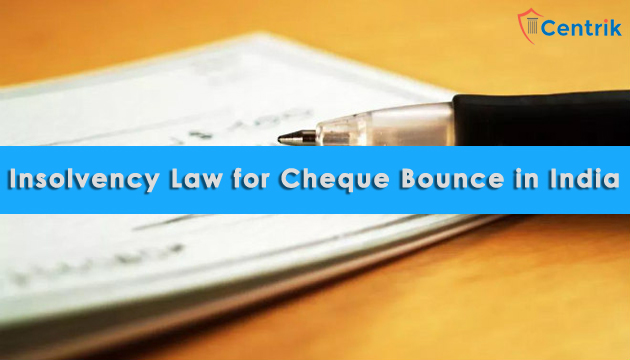
Status as on 29/07/2020
The Insolvency and Bankruptcy Code, 2016 represents radical change in the already prevalent corporate insolvency procedures, enabling creditors to restructure bad debts and rehabilitate corporate debtors within specific timelines. Since its enforcement various other changes have also been seen and witnessed, which have on the other hand have paved way for the other prevalent laws.
Recently, the Hon’ble National Company Law Appellate Tribunal (NCLAT) in the matter of M/s. Monotrone Leasing Pvt. Ltd. Vs. PM Cold Storage Pvt. Ltd., decided that even the bouncing of a cheque, given under the security of loan advanced to the Corporate Debtor by the Financial Creditor, would mean a default under the Insolvency & Bankruptcy Code, 2016.
CASE FACTS:
M/s. Monotrone Leasing Pvt. Ltd. [Hereinafter referred to as “Financial Creditor”] lent a sum of Rs.25,00,000/- to M/s. PM Cold Storage Pvt. Ltd., [Hereinafter referred as “Corporate Debtor”] which was to be returned back within 90 days to the Financial Creditor with an interest of 15% per annum. That the money was transferred through RTGS and the same was duly acknowledged by the Corporate Debtor through a letter written to the Financial Creditor and against the said loan a cheque of the same amount was also handed over to the Financial Creditor. However, the Corporate Debtor paid the interest for a few months and later failed to repay the amount in the said time period and thereby committed the default.
Decision of The Hon’ble Adjudicating Authority:
The Financial Creditor filed a case under Section 7 of IBC before The Hon’ble National Company Law Tribunal, Mumbai Bench. That the same was rejected on the ground that the Adjudicating Authority cannot act as a Recovery Tribunal, as the Financial Creditor neither had any proof with regards to the application for the loan nor could produce the certificate under the Information Utility. The Hon’ble Adjudicating Authority also drew adverse inference against the Financial Creditor on account of non-submission of the documents to prove as to how the loan was obtained from NBFC. The Hon’ble Adjudicating Authority assuming the fact that the Corporate Debtor being in a solvent position cannot commit a default and thus the Section 7 petition was dismissed.
Held:
The Hon’ble National Company Law Appellate Tribunal (NCLAT) while setting aside the order passed by the Hon’ble Adjudicating Authority held that the written communication/acknowledgement of the money received by the Corporate Debtor to the Financial Creditor, is an undisputed admission to the fact that the money has been received by the Corporate Debtor. Furthermore, the bank entries made by the Corporate Debtor for the payment of the interest amount and deduction of the TDS from the same also proves the fact that the Corporate Debtor took the loan, as financial debt, and had to repay the same which was defaulted. The Hon’ble Appellate Tribunal, while dismissing the claims made by the Adjudicating Authority with regards to the non-submission of the documents from NBFC, held that a section 7, 9 and 10 petition under IBC for the initiation of CIRP, has to be either admitted or rejected on the basis of the parameters that already had been laid down in a catena of cases by the Hon’ble Supreme Court of India.
That the Hon’ble Appellate Authority further clarifies that merely of the basis of the presumption that the Corporate Debtor being a solvent company would not commit any default, was wrong since the inability to clear a debt and committing default are two different aspects which cannot be adjudged on same parameters. Inability to pay a debt has no relevance for admitting or rejecting the petition for initiation of CIRP under IBC, it is the default which has to be determined. In view of the above stated grounds and findings, the Hon’ble Appellate Authority allowed the appeal and directed the Adjudicating Authority to pass an order for initiation of CIRP against the Corporate Debtor.
Conclusion:
The basis requirement for admission or rejection of a petition for the initiation of CIRP under IBC has to be under the folds of the parameters which have been laid down by the Hon’ble Apex Court in the matter of Innovative Industries Ltd. vs. ICICI Bank (2018) 1 SCC 407 and Swiss Ribbons(P) Ltd. Vs. Union of India (2019) 4 SCC1 17. Also the crucial point to be considered whilst deciding a petition is to determine the default which has been committed by the Corporate Debtor and not the inability to pay off the debts.
Disclaimer:
The above article is based on the personal interpretation of the judicial pronouncement and related laws which may be different from person to person. For more clarification, please reach us at support@centrik.in




 join For Updates
join For Updates